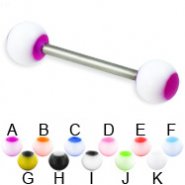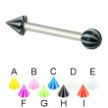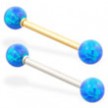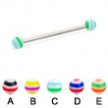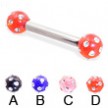Panda ball titanium straight barbell, 14 ga
- Gauge (Thickness): 14 (1.6mm)
- Material: acrylic
- Material: surgical grade solid titanium
- Type: straight barbell
Shown: 16mm straight barbell with 6mm balls.
| Click on the picture to see a big picture and description of the body jewelry you are interested in. | |||||||||
|---|---|---|---|---|---|---|---|---|---|
|
Beach ball and cone straight barbell,...
$4.20
Beach ball and cone straight barbell, 12 ga
Shown: 16mm straight barbell. |
14K Gold straight barbell with Blue...
$39.99
14K Gold straight barbell with Blue opal balls
|
Long barbell (industrial barbell) with circle...
$3.99
Long barbell (industrial barbell) with circle balls, 12 ga
Shown: 38mm straight barbell with 6mm balls. |
Straight barbell with multi-gem acrylic colored...
$7.49
Straight barbell with multi-gem acrylic colored balls, 10 ga
shown: 5/8" (16mm) length |
||||||
TREATING ORAL PIERCINGS
The piercing is susceptible to infection while it is healing. Appropriate aftercare is important to reduce the risk of infection.
Wash your hands thoroughly with antibacterial soap before touching your piercing or jewelry.
Most piercers suggest rinsing with an antiseptic mouthwash after eating, drinking anything other than water and smoking.
Mouthwashes are not intended to be used as often as typically used for piercing aftercare. Mouthwashes with a high alcohol content quickly dry out the tongue's protective mucous layer. Alcohol-free and reduced alcohol mouthwashes such as Biotene (1), TECH 2000 (2), and Oral-B brands are suggested over mouthwashes such as Listerine which have a high alcohol content. If you use an alcohol-based mouthwash dilute 50% with preferably distiled, bottled water. After using any mouthwash rinse with water to reduce mouthwash residues and dryness.
A white discoloration of the tongue indicates that the mouthwash is being over used. When over used the mouthwash dries out the mucous layer of the tongue, upsets the pH and depletes the healthy and necessary bacteria of the mouth. Depletion of healthy bacteria can result in thrush (Candida albicans), a fungal infection indicated by a white carpetlike layer on the tongue. Medications for treating thrush are only available with a doctor's prescription. In some cases the condition of the mouth can be restored if frequency of use is reduced. Some people have successfully treated minor thrush by rinsing with warm salt water containing a few drops of tea tree oil, said to be fungicidal.
Oral cleansing antiseptics such as PerOxyl and Gly-Oxide containing peroxide
or carbamide peroxide may be detrimental towards healing when used for an
extended period of time. Use of these products in addition to antiseptic
mouthwash is unnecessary. Additionally, the US Food and Drug Administration
has declared «oral wound healing agents [including] allantoin and
carbamide peroxide in anhydrous glycerin» as «unacceptable» because these
products have not been found to be safe and/or effective for treatment of
oral wounds; these products have effectively been recalled.
Tongue piercings produce a discharge just as any other piercing. This discharge is sticky and white. Dark yellow or green discharge indicates an infection.
During the first 24 to 48 hours the tongue usually swells to almost twice its normal size. Apply ice and drink ice water to minimize swelling and tenderness. Some people use over the counter anti-inflammatory medications to prevent or reduce swelling. Do not take Aspirin which thins the blood.
Swelling should steadily recede during the next 3 to 5 days. Usually the area immediately around the piercing will be swollen for and additional 2 to 4 weeks.
Bleeding usually stops immediately with application of ice. The piercing may spot during the next few hours. If the piercing does not clot or bleeds after 48 hours the piercing may have nicked a blood vessel and may require medical attention. Using a needle thicker than the jewelry often results in heavy bleeding. If the piercing bleeds while you sleep or upon waking the piercing may have become dry during the night, causing the clot to adhere to the jewelry and reopen the wound when the barbell is moved.
After the swelling has receeded, warm salt water rinses may be used to remove discharge and lymph secretions. ¼ teaspoon sea salt or table salt to 8 ounces of distilled water is suggested. minutes once or twice a day.
The inside entrance of lip, labret, cheek piercings should be disinfected as described for tongue piercings. The outside piercing should be cleaned following the instructions for facial piercings.
Warm salt water rinses are also suggested to accelerate healing.
Do not allow your piercings to come into contact with another person's bodily fluids.
Avoid spicy or hot foods. Avoid consuming alcoholic beverages during the first week; alcohol is a chemical irritant and thins the blood which can cause excessive bleeding and swelling.
While smoking may be irritating but not necessarily damaging to a new piercing the use of chewed tobacco products is highly discouraged in the case of any oral piercing as the use of chewed tobacco has been attributed to oral cancers and lesions.
Oral jewelry will collect plaque, especially in the crevice between the ball or disc and the bar. Plaque traps bacteria and can cause the jewelry to have a bad odor. Daily use of an anti-plaque rinse is suggested to prevent plaque build-up. To remove a build-up of plaque, remove and soak jewelry in an antibacterial denture cleaner following the package directions.
